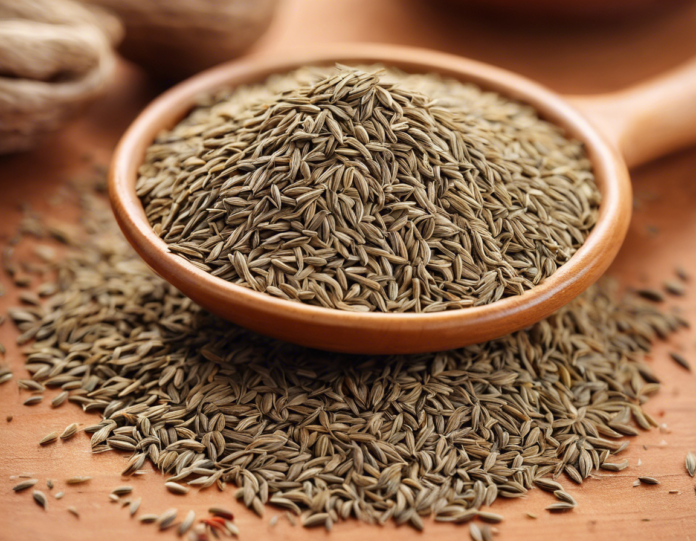Introduction
Cumin seeds, popularly known as jeera in Hindi, are a prominent spice used in Indian cuisine for centuries. These tiny, elongated seeds pack a powerful punch of flavor and boast a plethora of health benefits. Apart from being a culinary staple, cumin seeds are also utilized in traditional medicine due to their medicinal properties.
Cumin Seeds: Nutritional Profile
Cumin seeds are rich in essential nutrients such as iron, copper, calcium, magnesium, and manganese. They are also a good source of fiber and contain a high concentration of antioxidants.
Benefits of Cumin Seeds
-
Digestive Health: Cumin seeds help in digestion by stimulating enzyme secretion, which aids in the breakdown of food.
-
Rich in Iron: Cumin seeds are a great source of iron, making them beneficial for individuals with anemia.
-
Boosts Immunity: The antioxidants present in cumin seeds help boost the immune system and protect the body from various infections.
-
Improves Respiratory Health: Cumin seeds contain anti-congestive properties that can alleviate respiratory conditions like asthma and bronchitis.
Cumin Seeds: Culinary Uses
-
Tadka/Tempering: Cumin seeds are often used in tadka, where they are spluttered in hot oil to release their aromatic oils before adding them to dishes like dal or sabzi.
-
Powdered Form: Ground cumin seeds are a staple in Indian spice blends such as garam masala and curry powder.
-
Tea: Cumin tea is a popular remedy for indigestion and bloating. Simply boil cumin seeds in water, strain, and consume.
-
Pickling: Cumin seeds are used in pickling recipes to enhance the flavors of preserved vegetables.
Cumin Seeds: Recipes
-
Jeera Rice: Fragrant basmati rice cooked with cumin seeds in ghee or oil, garnished with coriander leaves.
-
Jeera Aloo: Potatoes tempered with cumin seeds, turmeric, and other spices, making a flavorful side dish.
-
Cumin Tea: Boil a cup of water with cumin seeds, add honey and lemon for flavor, and enjoy this soothing beverage.
Health Benefits of Jeera Water
Jeera water is a simple and effective way to incorporate cumin seeds into your daily routine. To make jeera water, soak a teaspoon of cumin seeds in a glass of water overnight and drink the water the next morning on an empty stomach. This drink aids in digestion, boosts metabolism, and helps in weight loss.
Cumin Seeds in Ayurveda
According to Ayurveda, cumin seeds are considered to have a balancing effect on all three doshas – Vata, Pitta, and Kapha. They are particularly beneficial for pacifying the Vata dosha and improving digestive fire (Agni).
Frequently Asked Questions (FAQs)
Q1. Can cumin seeds help with weight loss?
A1. Yes, cumin seeds can aid in weight loss by boosting metabolism and aiding in digestion.
Q2. Are cumin seeds safe for pregnant women?
A2. Cumin seeds are generally safe for consumption during pregnancy in moderate amounts. However, it is advisable to consult a healthcare provider before including them in the diet.
Q3. How can cumin seeds be stored for maximum freshness?
A3. Cumin seeds should be stored in an airtight container in a cool, dark place to retain their flavor and aroma.
Q4. Are there any side effects of consuming cumin seeds?
A4. While cumin seeds are safe for most people, excessive consumption may cause gastric discomfort in some individuals.
Q5. Can cumin seeds be used topically for skin conditions?
A5. Yes, a paste of cumin seeds can be applied topically to treat skin conditions like eczema or acne due to its anti-inflammatory properties.
Q6. What is the difference between cumin seeds and caraway seeds?
A6. Though often confused, cumin and caraway seeds are from different plants and have distinct flavors. Cumin seeds are lighter in color and have a warm, earthy flavor, while caraway seeds are darker and have a slightly sweet and peppery taste.
Q7. How can cumin seeds be included in a daily diet?
A7. Cumin seeds can be added to dishes during cooking, sprinkled on salads, yogurts, or used to make refreshing drinks like jeera water or tea.
Q8. Can cumin seeds be beneficial for individuals with diabetes?
A8. Yes, cumin seeds may help individuals with diabetes by regulating blood sugar levels. However, it is advisable to consult a healthcare provider before making significant dietary changes.
Q9. Are there different varieties of cumin seeds available?
A9. Yes, there are various types of cumin seeds, including black cumin seeds, which have a slightly stronger flavor, and Iranian or Syrian cumin seeds, known for their aromatic properties.
Q10. Can cumin seeds be used in baking?
A10. Yes, cumin seeds can add an earthy and warm flavor to baked goods like bread, biscuits, or savory pastries.
In conclusion, cumin seeds, or jeera, are a versatile spice that not only enhances the flavor of dishes but also offers numerous health benefits. From aiding digestion to boosting immunity, cumin seeds are a must-have in every kitchen pantry. Try incorporating them into your daily meals to experience their culinary and medicinal wonders.
